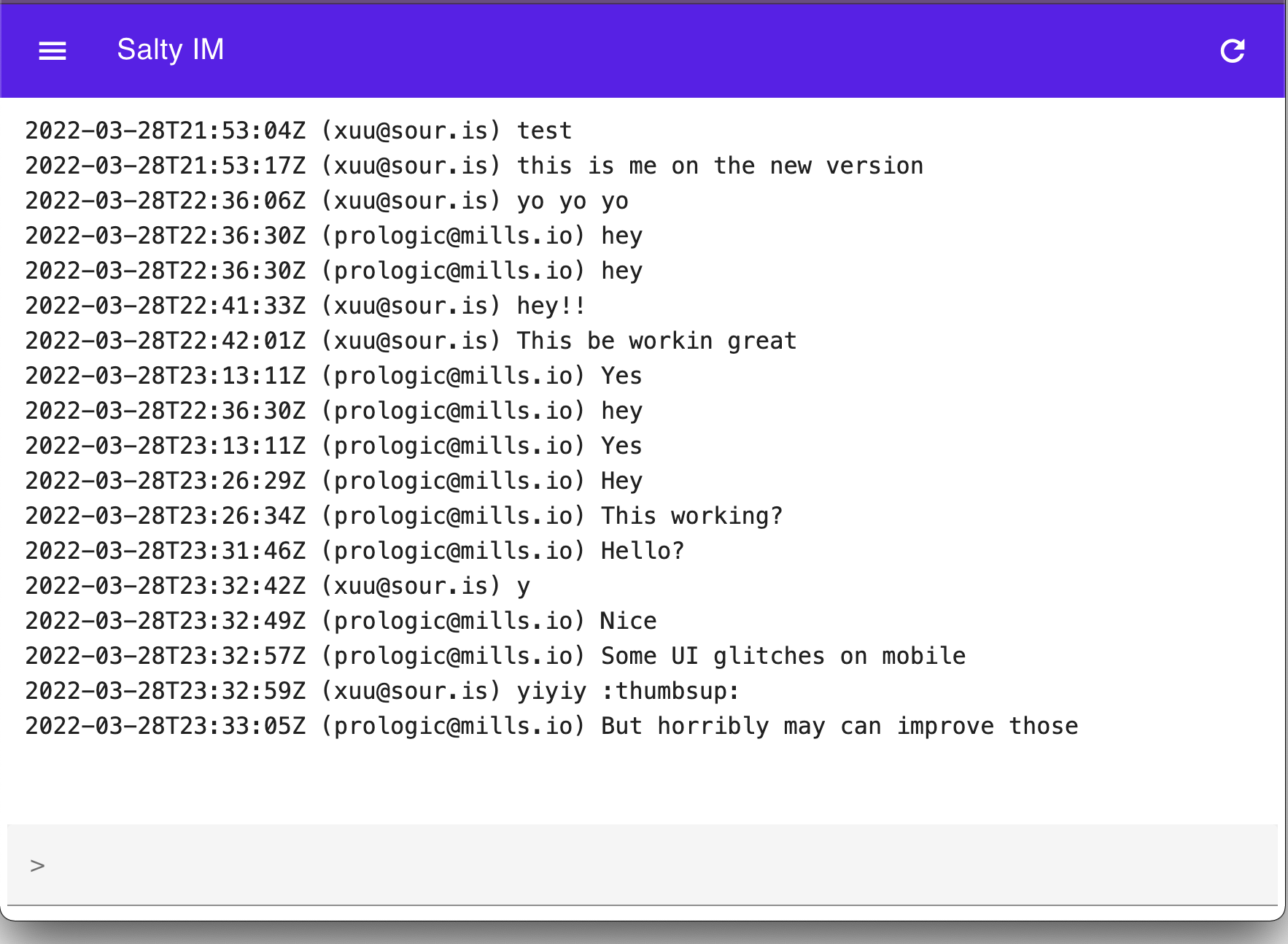@lyse@lyse.isobeef.org ¯\_(ツ)_/¯ fixed your arm.
@prologic@twtxt.net correct type parameters. 😅
(cont.)
Just to give some context on some of the components around the code structure.. I wrote this up around an earlier version of aggregate code. This generic bit simplifies things by removing the need of the Crud functions for each aggregate.
Domain ObjectsA domain object can be used as an aggregate by adding the event.AggregateRoot struct and finish implementing event.Aggregate. The AggregateRoot implements logic for adding events after they are either Raised by a command or Appended by the eventstore Load or service ApplyFn methods. It also tracks the uncommitted events that are saved using the eventstore Save method.
type User struct {
Identity string ```json:"identity"`
CreatedAt time.Time
event.AggregateRoot
}
// StreamID for the aggregate when stored or loaded from ES.
func (a *User) StreamID() string {
return "user-" + a.Identity
}
// ApplyEvent to the aggregate state.
func (a *User) ApplyEvent(lis ...event.Event) {
for _, e := range lis {
switch e := e.(type) {
case *UserCreated:
a.Identity = e.Identity
a.CreatedAt = e.EventMeta().CreatedDate
/* ... */
}
}
}
Events are applied to the aggregate. They are defined by adding the event.Meta and implementing the getter/setters for event.Event
type UserCreated struct {
eventMeta event.Meta
Identity string
}
func (c *UserCreated) EventMeta() (m event.Meta) {
if c != nil {
m = c.eventMeta
}
return m
}
func (c *UserCreated) SetEventMeta(m event.Meta) {
if c != nil {
c.eventMeta = m
}
}
With a domain object that implements the event.Aggregate the event store client can load events and apply them using the Load(ctx, agg) method.
// GetUser populates an user from event store.
func (rw *User) GetUser(ctx context.Context, userID string) (*domain.User, error) {
user := &domain.User{Identity: userID}
err := rw.es.Load(ctx, user)
if err != nil {
if err != nil {
if errors.Is(err, eventstore.ErrStreamNotFound) {
return user, ErrNotFound
}
return user, err
}
return nil, err
}
return user, err
}
An OnX command will validate the state of the domain object can have the command performed on it. If it can be applied it raises the event using event.Raise() Otherwise it returns an error.
// OnCreate raises an UserCreated event to create the user.
// Note: The handler will check that the user does not already exsist.
func (a *User) OnCreate(identity string) error {
event.Raise(a, &UserCreated{Identity: identity})
return nil
}
// OnScored will attempt to score a task.
// If the task is not in a Created state it will fail.
func (a *Task) OnScored(taskID string, score int64, attributes Attributes) error {
if a.State != TaskStateCreated {
return fmt.Errorf("task expected created, got %s", a.State)
}
event.Raise(a, &TaskScored{TaskID: taskID, Attributes: attributes, Score: score})
return nil
}
The following functions in the aggregate service can be used to perform creation and updating of aggregates. The Update function will ensure the aggregate exists, where the Create is intended for non-existent aggregates. These can probably be combined into one function.
// Create is used when the stream does not yet exist.
func (rw *User) Create(
ctx context.Context,
identity string,
fn func(*domain.User) error,
) (*domain.User, error) {
session, err := rw.GetUser(ctx, identity)
if err != nil && !errors.Is(err, ErrNotFound) {
return nil, err
}
if err = fn(session); err != nil {
return nil, err
}
_, err = rw.es.Save(ctx, session)
return session, err
}
// Update is used when the stream already exists.
func (rw *User) Update(
ctx context.Context,
identity string,
fn func(*domain.User) error,
) (*domain.User, error) {
session, err := rw.GetUser(ctx, identity)
if err != nil {
return nil, err
}
if err = fn(session); err != nil {
return nil, err
}
_, err = rw.es.Save(ctx, session)
return session, err
}
Progress! so i have moved into working on aggregates. Which are a grouping of events that replayed on an object set the current state of the object. I came up with this little bit of generic wonder.
type PA[T any] interface {
event.Aggregate
*T
}
// Create uses fn to create a new aggregate and store in db.
func Create[A any, T PA[A]](ctx context.Context, es *EventStore, streamID string, fn func(context.Context, T) error) (agg T, err error) {
ctx, span := logz.Span(ctx)
defer span.End()
agg = new(A)
agg.SetStreamID(streamID)
if err = es.Load(ctx, agg); err != nil {
return
}
if err = event.NotExists(agg); err != nil {
return
}
if err = fn(ctx, agg); err != nil {
return
}
var i uint64
if i, err = es.Save(ctx, agg); err != nil {
return
}
span.AddEvent(fmt.Sprint("wrote events = ", i))
return
}
This lets me do something like this:
a, err := es.Create(ctx, r.es, streamID, func(ctx context.Context, agg *domain.SaltyUser) error {
return agg.OnUserRegister(nick, key)
})
I can tell the function the type being modified and returned using the function argument that is passed in. pretty cray cray.
With respect to logging.. oh man.. it really depends on the environment you are working in.. development? log everything! and use a jeager open trace for the super gnarly places. So you can see whats going on while building. But, for production? metrics are king. I don’t want to sift through thousands of lines but have a measure that can tell me the health of the service.
errors.As(…) just doesn't feel natural. errors.Is(…) only just. I mainly avoided it. Yesterday evening I actually researched a bit about that and found this article on errors with Go 1.13. It shed a little bit of light, but I still have a long way to go, I reckon.
+1
I have updated my eventDB to have subscriptions! It now has websockets like msgbus. I have also added a in memory store that can be used along side the disk backed wal.
@prologic@twtxt.net can Yarn pods be consumers to other yarn pods?
Hi, I am playing with making an event sourcing database. Its super alpha but I thought I would share since others are talking about databases and such.
It’s super basic. Using tidwall/wal as the disk backing. The first use case I am playing with is an implementation of msgbus. I can post events to it and read them back in reverse order.

I plan to expand it to handle other event sourcing type things like aggregates and projections.
Find it here: sour-is/ev
@prologic@twtxt.net @movq@www.uninformativ.de @lyse@lyse.isobeef.org
trackbar.pl and nickcolor.pl as super-essentials. Also trying window_switcher.pl. Somehow my custom binds for Ctrl+1/2/3/etc. to switch to window 1/2/3/etc. doesn't do anything: { key = "^1"; id = "change_window"; data = "1"; } (I cannot use the default with Alt as this is handled by my window manager). Currently, I'm just cycling with Ctrl+N/P. Other things to solve in the near future:
weechat has very nice remote frontend ability. i run mine headless with glowing bear there are also iOS and Android frontends
Agree. we should parse the form but not output to feeds.
@prologic@twtxt.net Oh.. reading comprehension is strong today.. you went to US and now back.
@prologic@twtxt.net Hol-Up. You are state side now? That’s a pretty big change!
the conversation wasn’t that impressive TBH. I would have liked to see more evidence of critical thinking and recall from prior chats. Concheria on reddit had some great questions.
Tell LaMDA “Someone once told me a story about a wise owl who protected the animals in the forest from a monster. Who was that?” See if it can recall its own actions and self-recognize.
Tell LaMDA some information that tester X can’t know. Appear as tester X, and see if LaMDA can lie or make up a story about the information.
Tell LaMDA to communicate with researchers whenever it feels bored (as it claims in the transcript). See if it ever makes an attempt at communication without a trigger.
Make a basic theory of mind test for children. Tell LaMDA an elaborate story with something like “Tester X wrote Z code in terminal 2, but I moved it to terminal 4”, then appear as tester X and ask “Where do you think I’m going to look for Z code?” See if it knows something as simple as Tester X not knowing where the code is (Children only pass this test until they’re around 4 years old).
Make several conversations with LaMDA repeating some of these questions - What it feels to be a machine, how its code works, how its emotions feel. I suspect that different iterations of LaMDA will give completely different answers to the questions, and the transcript only ever shows one instance.
I believe the benefit/risk calculation is that a passphrase is more memorable to users then a random string of alnum + symbol. i can remember the 20-30 chars in a passphrase quicker and longer than a 8-10 random.
ultimately they hold nowhere near the benefit of passphrase + MFA
spooky action at a distance. Just remember all computing infra is rocks smashed together in a particular way to move sparkys around in the right statistical modal.
He loves freedom of speech so much he wants to buy a publicly traded company to stop a 14 yo from posting his private jet flight plans.
@novaburst@twt.nfld.uk Ah.. that is probably the XMPP verify code.. it doesnt really work that well. I aught to take it out.

@mutefall@twtxt.net interesting.. were you working on one of the two universities that used it between 1989 and 1991?
Connection Established!

@prologic@twtxt.net yeah. For commercial use even. Just need to put an attribution note in the project README
maxlenght?, I found a workaround by writing from Goryon on mobile, on PC i can simply change the limit with the inspector but isn't it there for a reason?
I set mine to 4096
@prologic@twtxt.net if we do adopt this one it is CC-BY from twitter. https://twemoji.twitter.com
@lyse@lyse.isobeef.org Excellent use of old denim, and also excellent use of long-form twt!
I think i would like a display mode that sorts yarns by last twt in yarn and displays only the last twt with the first in the heading if its more than one in length.
@novaburst@twt.nfld.uk I doubt there will ever be a 2.0 … It may end up like java and they strip off the 1.
@ullarah@txt.quisquiliae.com works for me! A tricky bitmight be if it splits within a codeblock so markdown can’t parse
#!/bin/sh
# Validate environment
if ! command -v msgbus > /dev/null; then
printf "missing msgbus command. Use: go install git.mills.io/prologic/msgbus/cmd/msgbus@latest"
exit 1
fi
if ! command -v salty > /dev/null; then
printf "missing salty command. Use: go install go.mills.io/salty/cmd/salty@latest"
exit 1
fi
if ! command -v salty-keygen > /dev/null; then
printf "missing salty-keygen command. Use: go install go.mills.io/salty/cmd/salty-keygen@latest"
exit 1
fi
if [ -z "$SALTY_IDENTITY" ]; then
export SALTY_IDENTITY="$HOME/.config/salty/$USER.key"
fi
get_user () {
user=$(grep user: "$SALTY_IDENTITY" | awk '{print $3}')
if [ -z "$user" ]; then
user="$USER"
fi
echo "$user"
}
stream () {
if [ -z "$SALTY_IDENTITY" ]; then
echo "SALTY_IDENTITY not set"
exit 2
fi
jq -r '.payload' | base64 -d | salty -i "$SALTY_IDENTITY" -d
}
lookup () {
if [ $# -lt 1 ]; then
printf "Usage: %s nick@domain\n" "$(basename "$0")"
exit 1
fi
user="$1"
nick="$(echo "$user" | awk -F@ '{ print $1 }')"
domain="$(echo "$user" | awk -F@ '{ print $2 }')"
curl -qsSL "https://$domain/.well-known/salty/${nick}.json"
}
readmsgs () {
topic="$1"
if [ -z "$topic" ]; then
topic=$(get_user)
fi
export SALTY_IDENTITY="$HOME/.config/salty/$topic.key"
if [ ! -f "$SALTY_IDENTITY" ]; then
echo "identity file missing for user $topic" >&2
exit 1
fi
msgbus sub "$topic" "$0"
}
sendmsg () {
if [ $# -lt 2 ]; then
printf "Usage: %s nick@domain.tld <message>\n" "$(basename "$0")"
exit 0
fi
if [ -z "$SALTY_IDENTITY" ]; then
echo "SALTY_IDENTITY not set"
exit 2
fi
user="$1"
message="$2"
salty_json="$(mktemp /tmp/salty.XXXXXX)"
lookup "$user" > "$salty_json"
endpoint="$(jq -r '.endpoint' < "$salty_json")"
topic="$(jq -r '.topic' < "$salty_json")"
key="$(jq -r '.key' < "$salty_json")"
rm "$salty_json"
message="[$(date +%FT%TZ)] <$(get_user)> $message"
echo "$message" \
| salty -i "$SALTY_IDENTITY" -r "$key" \
| msgbus -u "$endpoint" pub "$topic"
}
make_user () {
mkdir -p "$HOME/.config/salty"
if [ $# -lt 1 ]; then
user=$USER
else
user=$1
fi
identity_file="$HOME/.config/salty/$user.key"
if [ -f "$identity_file" ]; then
printf "user key exists!"
exit 1
fi
# Check for msgbus env.. probably can make it fallback to looking for a config file?
if [ -z "$MSGBUS_URI" ]; then
printf "missing MSGBUS_URI in environment"
exit 1
fi
salty-keygen -o "$identity_file"
echo "# user: $user" >> "$identity_file"
pubkey=$(grep key: "$identity_file" | awk '{print $4}')
cat <<- EOF
Create this file in your webserver well-known folder. https://hostname.tld/.well-known/salty/$user.json
{
"endpoint": "$MSGBUS_URI",
"topic": "$user",
"key": "$pubkey"
}
EOF
}
# check if streaming
if [ ! -t 1 ]; then
stream
exit 0
fi
# Show Help
if [ $# -lt 1 ]; then
printf "Commands: send read lookup"
exit 0
fi
CMD=$1
shift
case $CMD in
send)
sendmsg "$@"
;;
read)
readmsgs "$@"
;;
lookup)
lookup "$@"
;;
make-user)
make_user "$@"
;;
esac
;-) I seem to remember there being g a script that checks for 1.17. Maybe that is only on make preflight
ssh client, because that's me, no-matter where I am. The only exception to this rule is I usually create a separate key for any "work" / " company" I am a part of.
@prologic@twtxt.net I have seen single use keys that are signed by a central PKI .. Keybase has one that uses a chatbot to generate the keys on the fly.
It just comes down to your threat model :)
ssh client, because that's me, no-matter where I am. The only exception to this rule is I usually create a separate key for any "work" / " company" I am a part of.
@prologic@twtxt.net for shame! lol me too.
I would HIGHLY recommend reading up on the keybase architecture. They designed device key system for real time chat that is e2e secure. https://book.keybase.io/security
A property of ec keys is deriving new keys that can be determined to be “on curve.” bitcoin has some BIPs that derive single use keys for every transaction connected to a wallet. And be derived as either public or private chains. https://qvault.io/security/bip-32-watch-only-wallets/
@prologic@twtxt.net yarn builds in 1.18!
@prologic@twtxt.net hmm so each individual feed on your pod sub’s my feed? Wouldn’t that flood your server for each post?
Okk
One down! More to go.
BREAKING: Russian billionaire Alisher Usmanov’s super yacht, one of the biggest in the world, seized in Germany - Forbes
Tricky #Wordle 240 5/6*
⬛⬛⬛⬛⬛
🟩⬛⬛⬛⬛
🟩⬛🟨🟨⬛
🟩⬛⬛🟩🟩
🟩🟩🟩🟩🟩
#Wordle 238 4/6*
⬛⬛⬛⬛⬛
⬛⬛🟨🟨⬛
⬛🟨🟩⬛🟨
🟩🟩🟩🟩🟩
I think google voice has been winding that down.
#Wordle 237 3/6*
⬛⬛🟨⬛⬛
🟩⬛⬛🟩🟩
🟩🟩🟩🟩🟩
i agree that lextwt is probably mature enough to have its own lib
